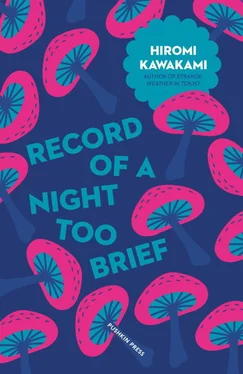In a while the telephone started ringing, I had to note down orders, and go back to check what we had in stock—and before I knew it, hours had passed. Mr Kosuga came back from his deliveries, and as we were having our third cup of green tea the sun started to go down. In the hours I spent sitting there, the thought of the snake occasionally flitted through my mind, but whenever I tried to focus on it, the thought dissolved. Just once, during a telephone call from a priest from Shōsenji Temple, one of our long-time customers, I was sure I heard him say the word “snake”. But in fact he’d said “simple vestment”, slurring some of the syllables.
However, Mr Kosuga brought the topic up as soon as he came back.
“You know that snake that you mentioned,” he said, checking the items customers had ordered in the ledger. “If it comes to your place, you will send it packing, won’t you?”
“What do you mean?”
“That snake that you mentioned.”
I looked at him. He looked back. I could see it dawning on him that the snake had already moved in with me.
“So it’s too late,” he said.
“Yes.”
“So you’re really sure you can’t do anything about it.”
He was being a little insistent, it seemed to me, but the next instant he began to croon, in that high little voice, the same ditty he’d been singing that morning.
You can’t be too careful,
No, you can’t be too careful…
Was he dreaming—engrossed in his own thoughts? Or was he in some sort of a tight spot? With Mr Kosuga, it was always difficult to tell. Maybe it was a bit of both. I was on the point of asking myself whether I’d been stupid to be so heedless, carrying on with my tasks, delaying coming to any decision about what to do with the snake, when it suddenly occurred to me where I’d heard that song. It was at a local festival, coming out of a float sponsored by a credit union near the station. Those lyrics, You can’t be too careful , set somehow to a musical arrangement, and recorded on a tape that ran on and on, had blared out while the float paraded through the streets. I had sat daydreaming inside the shop, which despite the festival had remained open for business, trying to stop the words of the jingle from entering my brain. But it seemed they had found their way in after all.
“Send it packing.”
“You think?”
“If you can, I’d advise, yes.”
“But can I?”
Mr Kosuga rubbed his brow with the palm of his hand, and didn’t reply. He put some banknotes in a linen drawstring bag, and locked up the till. Facing a figure of the Buddha inside one of the glass cases, he muttered namandabu namandabu , then switched the gas taps to the closed position, and placed a little saucer with a mound of purifying salt by the door of the washroom. Finally, he pulled down the shutter and turned off the lights.
“I’m not the wisest man in the world,” he said, “but there’s no need to take on responsibility for every stray that comes your way.”
All very well, I thought. But sometimes you only know what you should take on and what you should not when you don’t have the choice. But I didn’t say this out loud to Mr Kosuga.
I made my way home, wondering whether the snake would have left or whether she’d still be there. Already the snake was at the centre of my thoughts.
The snake was there. She was in her human form.
“Welcome back, Hiwako, dear,” she said.
“Yes, I’m home!” I replied, feeling as if we’d been greeting each other like this for years.
After that, she didn’t say anything else. I took a bath and did my laundry. Unwilling to take my clothes off in front of her, I did all my changing inside the bathroom, which was a bit cramped. When I emerged, in pyjamas that were still damp from the steam, the woman immediately brought out a beer.
“Come, let’s have a drink,” she said.
I was about to refuse, but the sight of the beer made me want to have some. Once I’d had a drink, the dishes of food started to tempt me, and then I had to have another drink. I glanced at the woman. She was looking completely relaxed.
“Hiwako, dear, I wonder if you remember,” she began. The area around her eyes had started to flush a deep red colour. “That time you fell out of a tree?”
Fell out of a tree? This was the first I’d heard of it.
“Your little friend Gen from next door ran round yelling, ‘Hiwako’s mum! Hiwako’s had a fall. She’s fallen out of a tree!’ It gave me such a fright, I almost collapsed!”
She was staring steadily at the air a few inches in front of her face, and her voice got a little loud. “I rushed over, and there you were sitting right underneath it. ‘So you’re OK,’ I said, and you said, ‘No, that’s the end of me.’ That’s so typical of you, Hiwako dear, to give that kind of an answer.”
I had no recollection of any such incident. “Are you sure you haven’t mixed me up with someone else?”
“No. How could I be mistaken—your very own mother?”
“My mother is in Shizuoka.” This was beginning to annoy me.
The woman went on, regardless: “Yes, that’s true, but I’m also your mother.”
“Don’t be ridiculous.”
“Hiwako, darling. Trust me. I know. ”
I felt the hair rise on the back of my neck.
The woman’s skin had a glossy, damp sheen. She was looking remarkably like a snake. The thought went through my mind that I had, just this minute, taken on responsibility for this woman, like it or not. I’d had this feeling any number of times, but the specific details had faded from memory.
The woman gazed at me with a doting expression.
“Hiwako, dearest. I want to take care of you, ” she said, in a cloying voice, and curled herself round into a ball. Then, before I knew it, she’d reverted to being a snake, and slithered up to the ceiling. She became like the image of a snake that someone had painted up there, and she wouldn’t be budged no matter how much I prodded and pulled.
I laid out my futon in a corner of the room, as far away as possible from the snake. I didn’t expect to be able to sleep, but I dropped off immediately and slept soundly all night.
“Miss Sanada, your voice seems weak today,” I heard Nishiko say from behind me as I sat checking sales slips, sipping my tea. I paused to take this in. She had only arrived in the shop a moment before, and we hadn’t yet said a word. Every so often Nishiko would come out with such statements. I’d arrive at work in the morning to be told as soon as she saw me, “You ate too much last night, Miss Sanada, didn’t you?” or “Today you’re going to feel down in the dumps all day.”
But she was often on target. Today my voice was little more than a peep, and my eyes wouldn’t open wide.
“Good morning,” I said, over my shoulder.
“What did I tell you?” she said, and smiled.
Mr Kosuga entered the shop, making a loud noise. The racket came from the object he carried in his hands. It was covered in a cloth. He put the object up on the glass counter of the case, and removed the cloth. It was a box. There was the sound of something moving around inside it, frantically.
“What’s that?” Nishiko asked.
Mr Kosuga put a finger to his lips: “Shh! You know— that .”
“Oh, that .”
I pretended to be taken up with the sales slips, and waited for what they would say next, but that was it. The smell of a lit cigarette reached me. I heard Mr Kosuga sigh.
For lunch Nishiko called a local restaurant for delivery of three orders of tempura over rice, and the three of us sat in the little room in the back and had our meal. About once a month, they would treat me to a large deluxe order of ten-don , with one extra prawn and an extra-generous heap of pickled aubergine.
Читать дальше

![Хироми Каваками - Strange Weather in Tokyo [= The Briefcase]](/books/29150/hiromi-kavakami-strange-weather-in-tokyo-the-br-thumb.webp)



![О Генри - Недолгий триумф Тильди [The Brief Debut of Tildy]](/books/415353/o-genri-nedolgij-triumf-tildi-the-brief-debut-of-thumb.webp)






